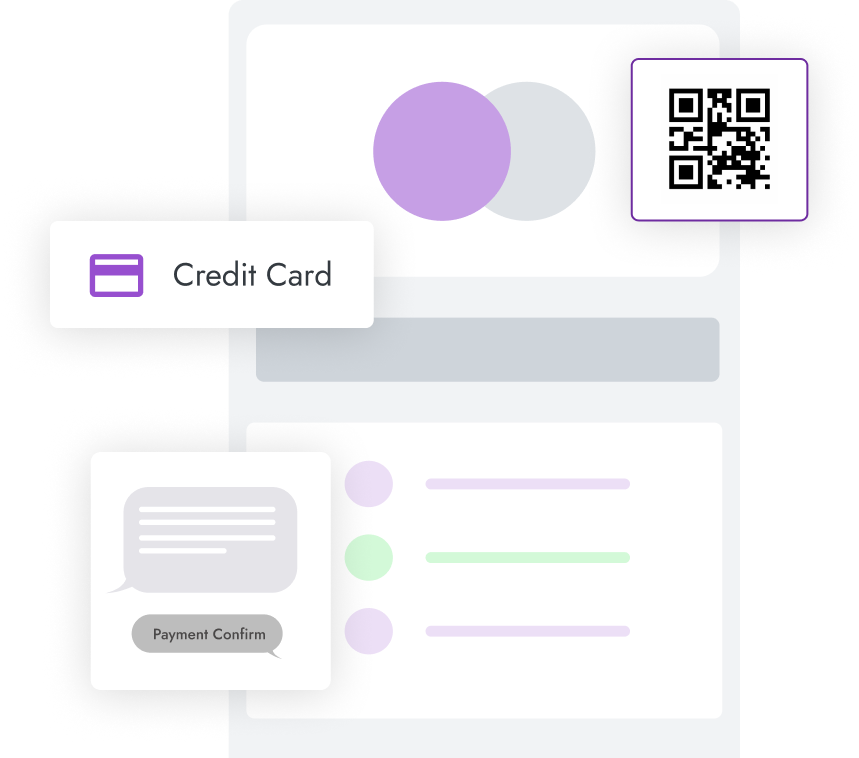With the rise of digital wallets, mobile payments, contactless cards, and cashless transactions, there will be more ways to pay than ever.
Challenges with Payments in Salons

There are several challenges that salons may face when it comes to payment processing:
- Managing multiple payment methods: Salons may accept a variety of payment methods, such as cash, credit and debit cards, and gift cards. This can be challenging, as each payment method has its own set of rules and requirements, and salons need to ensure that they are handling each one correctly.
- Keeping up with changes in payment technologies: Payment technologies are constantly evolving, and salons need to stay up-to-date with these changes in order to provide the most convenient and secure payment options for their customers.
- Ensuring compliance with payment regulations: Salons must adhere to a range of payment regulations, such as PCI DSS (Payment Card Industry Data Security Standard) and EMV (Europay, Mastercard, and Visa), which can be complex and time-consuming to implement.
- Preventing and resolving payment disputes: Customers may sometimes dispute charges on their credit or debit cards, and salons need to have processes in place to handle these disputes in a timely and fair manner.
- Maintaining accurate records and reporting: Salons need to keep accurate records of all payment transactions and prepare reports as needed. This can be a time-consuming task, especially if the salon has a high volume of transactions.
Cash payments in a salon:
Cash is one of the oldest forms of payment and it’s still popular in salons today. Most salon owners prefer cash because there are no processing fees, making it a cost-effective option. When accepting cash payments, you should have a secure cash register or safe onsite where customers can make their payments. You should also have policies in place to handle customer refunds and lost or stolen money.
Things to consider while handling cash transactions at your business. Here are some key points to consider when handling cash transactions at your business:
- Cash transactions can be prone to errors, so it's important to have an established routine in place to ensure accuracy.
- Train your staff to verify the validity of the money, repeat the amount received, calculate and count the change, and record the payment in the system.
- Use a cash register or point-of-sale system to help track sales and keep accurate records of cash transactions.
- Separate duties among employees, establish clear policies and procedures and keep a daily record of cash transactions to minimize the risk of errors and fraud.
- Deposit the money in the bank at the end of the day and keep a "float" of cash on hand for the next business day.
- Remember to thank the customer and confirm any follow-up appointments.

Credit card payments in a salon:
Credit cards are widely accepted across nearly all industries, including salons and spas. Most major credit cards such as Visa, MasterCard, American Express, and Discover are accepted in salons today. When accepting credit card payments you must be PCI compliant, which means your business must meet the Payment Card Industry's standards for data security. This helps protect the customer’s financial information and reduces the risk of fraud or identity theft.

Costs associated with accepting credit card payments for Salons. There are several costs associated with accepting credit card payments for salons:
- Transaction Fees: Credit card companies impose a fee on every transaction made. The amount of the fee is typically a certain percentage of the total sum, between 2-4%, contingent upon your merchant agreement and which type of card was used.
- Monthly fees: Some payment processors may require a monthly fee to use their services. This fee is typically in the range of $XX-$XX depending on the processor used.
- Equipment costs: If you choose to accept credit card payments in the salon, you'll need to purchase or lease a point-of-sale system or credit card reader. A basic POS system can cost $XXX-$XXX depending on the features and brand.
- Chargebacks: Chargebacks happen when a customer disputes a credit card transaction. The chargeback fee is typically between $XX-XX and covers the cost of processing and returning the funds to the customer.
Things to consider while handling credit card payments for Salons. When it comes to handling credit card payments, there are a few key points salons should consider:
- Choose a reliable and secure payment processor: When selecting a payment processor, it is critical to ensure that the provider adheres to necessary regulations such as PCI DSS and offers robust safety protocols like fraud prevention, data encryption, and other security features.
- Understand your fees and rates:Different payment processors offer different fees and rates. Be sure to thoroughly research the processor’s fees and rates to ensure you are getting the best deal for your business.
- Point-of-sale system and payment processor compatibility: Streamline transactions, keep tabs on sales figures, and manage customer data with relative ease by finding a payments processor compatible with your Point-of-Sale system.
- Train your staff: Make sure your staff is well-versed in credit card payment processing and the system you are using. Ensure they understand how to process payments, handle refunds, spot fraudulent activity, and more.
- Protect against fraud and chargebacks: Credit card fraud and chargebacks are both expensive and time-consuming to manage. Utilizing safety protocols such as ID verification, along with utilizing fraud prevention tools will help minimize the possibility of fraudulent activities or charges being presented back on your business.
- Keep accurate records: In order to accurately track sales, reconcile accounts and cultivate financial reports, it is imperative that a system for recording credit card transactions be established. Applying the necessary steps to ensure precise record-keeping will allow you to stay ahead of your business's fiscal demands.

Gift cards and certificates in a salon:
Gift cards and certificates are a popular form of payment for salons and spas. They provide the customer with an easy way to pay while offering you an additional revenue stream. When accepting gift cards or certificates in your salon, it is important to understand how they work and the process involved.
Things to consider while handling Gift card payments for Salons
- Ensure that your business is set up to accept gift cards or certificates from the applicable issuer.
- Make sure you have an adequate system in place to track the usage of gift cards or certificates by customers.
- Be aware of any expiration dates associated with them, as well as any fees for reissuing lost cards or refunds for unused amounts.
- Provide customers with a receipt for their purchase and clearly explain the terms and conditions associated with using the gift card or certificate.
- Be sure to thank customers for purchasing a gift card or certificate from your business.


Issuing and Managing gift cards using Uzeli:
Uzeli Salon Management software offers a powerful gift card management solution that simplifies the lives of salon owners and employees alike. With Uzeli, salons can create custom gift cards (digital and physical) and vouchers with their own logo and design. They also have access to real-time data on all sales transactions associated with each gift card or certificate.
Furthermore, this invaluable system provides insights into customer usage patterns so you can optimize your marketing campaigns and loyalty programs for maximum success!